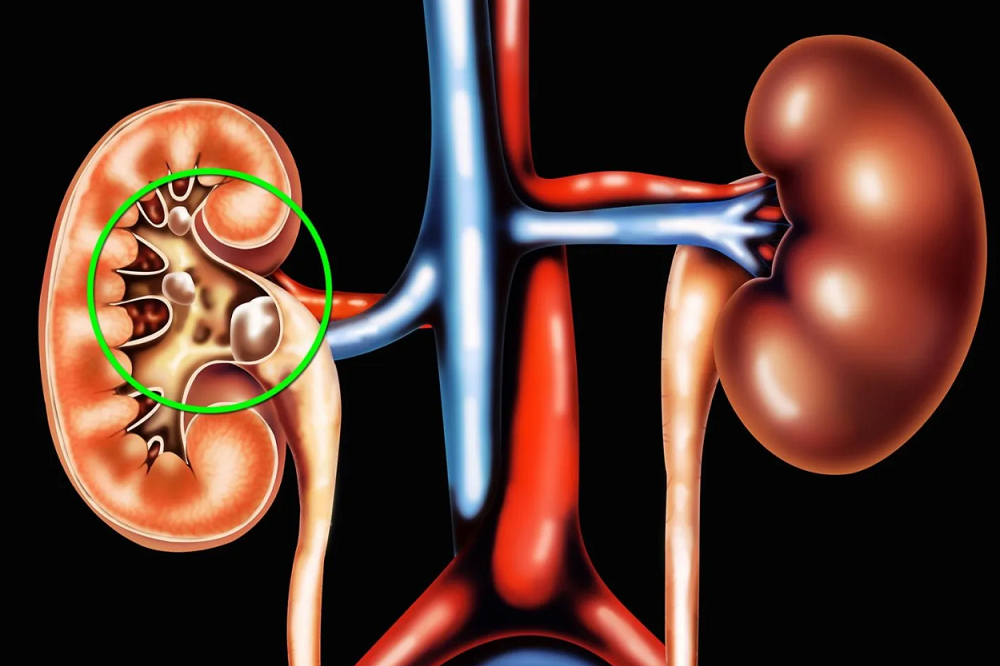Kidney stones vs. kidney cancer – both these situations are troublesome. On top of that, they often get misdiagnosed because they have similar symptoms.
A fever, blood in urine, and severe pain on one side of the lower back are all possible indications of kidney stones or kidney cancer.
But how to understand kidney stones vs. kidney cancer?
Let’s discuss the differences between these two kidney diseases and understand their symptoms and causes. We will also go through the lifestyle strategies that can help prevent these.
Table of Contents
How Do You Feel the Kidney Discomfort?
Kidney discomfort is a broad term that encompasses a range of sensations, from mild pain to severe agony.
The feeling often depends on the underlying cause.
In the case of kidney stones, the discomfort typically begins as a sharp, intense pain, usually in the lower back, side, or abdomen.
This pain is often described as “colicky” because it comes and goes in waves. It can be excruciating when a stone moves within the urinary tract.
On the other hand, kidney cancer may not initially manifest noticeable discomfort or pain. In some cases, it might be asymptomatic, and symptoms only appear in advanced stages.
However, as the cancer progresses, patients may experience persistent pain in the side or lower back, accompanied by other symptoms like weight loss, fatigue, and blood in the urine.
Kidney Stones vs. Kidney Cancer: Understand the Difference
Now that we have a general understanding of the discomfort associated with kidney stones and kidney cancer, let’s take a closer look at these two conditions:
- Kidney Stones: Kidney stones are solid, crystalline mineral deposits that form in the kidneys or urinary tract. They can vary in size from tiny grains to larger stones that can cause significant pain and complications.
- Kidney Cancer: Kidney cancer, also known as renal cell carcinoma, is a malignant tumor that develops in the cells of the kidney. It is a more severe condition than kidney stones, as it involves the uncontrolled growth of cancer cells in the organ.
What are the Symptoms of Kidney Stones?
You can understand the presence of kidney stones with the following symptoms:
- Intense and intermittent pain in the back, side, or abdomen
- Painful urination
- Haematuria (blood in the urine)
- Frequent urination
- Cloudy or foul-smelling urine
- Nausea and vomiting
- Fever and chills (if an infection is present)
What are the Causes of Kidney Stones?
Kidney stones can occur due to several reasons, such as:
- Dehydration: Insufficient fluid intake can lead to the concentration of minerals and salts in the urine, promoting stone formation.
- Diet: Consuming excessive amounts of certain foods like oxalate-rich foods (spinach, nuts) or high-sodium foods can contribute to stone formation.
- Family history: A genetic predisposition can increase the risk of developing kidney stones.
- Medical conditions: Conditions such as obesity, urinary tract infections, and digestive disorders can increase the risk.
What are the Symptoms of Kidney Cancer?
Here’s how you can understand the kidney discomfort when it’s associated with cancer:
- Persistent pain in the side or lower back
- Unexplained weight loss
- Fatigue
- Blood in the urine
- Anemia (low red blood cell count)
- Swelling or mass in the abdomen
- Hypertension (high blood pressure)
What are the Causes of Kidney Cancer?
Kidney cancer can occur due to some lifestyle factors, such as:
- Smoking: Smoking is a leading risk factor for kidney cancer.
- Obesity: Excess body weight is associated with an increased risk of kidney cancer.
- High blood pressure: Hypertension can elevate the risk.
- Family history: A family history of kidney cancer can raise the risk.
- Occupational exposure: Certain jobs with exposure to chemicals and toxins may increase the risk.
Doctor Recommendation: Dr. Tashbeeb Gulzar is one of the best nephrologists in Lahore. With experience spanning over 25 years, he is well-trained in treating and diagnosing all kinds of kidney diseases.
Kidney Stones Vs. Kidney Cancer: What to Do to Avoid These?
Preventing kidney diseases, whether it’s kidney stones or kidney cancer, is essential for maintaining overall health.
Here are some lifestyle strategies that can help:
- Stay Hydrated: Drinking plenty of water dilutes urine and reduces the risk of kidney stone formation. Aim to consume at least 8-10 glasses of water a day.
- Balanced Diet: Follow a balanced diet that includes a variety of fruits, vegetables, whole grains, and lean proteins. Limit high-oxalate and high-sodium foods.
- Maintain a Healthy Weight: Obesity is a risk factor for kidney stones and kidney cancer. Achieve and maintain a healthy weight through diet and regular exercise.
- Quit Smoking: If you smoke, seek help to quit. Smoking is a major risk factor for kidney cancer.
- Monitor Blood Pressure: Regularly check your blood pressure and take steps to keep it within a healthy range.
- Limit Alcohol: Excessive alcohol consumption can harm the kidneys. Limit alcohol intake to moderate levels or avoid it altogether.
- Exercise Regularly: Engage in regular physical activity to maintain a healthy body weight and overall well-being.
- Manage Stress: Chronic stress can negatively impact your health. Try to practice stress management techniques like yoga, meditation, or deep breathing exercises.
- Regular Check-ups: Visit your healthcare provider regularly for check-ups and screenings, especially if you have a family history of kidney diseases.
When to Visit a Nephrologist?
Visit a nephrologist if you experience symptoms like severe flank pain, blood in urine, or frequent urination, as these could be signs of kidney stones.
For kidney cancer concerns, seek medical attention if you notice symptoms such as blood in urine, unexplained weight loss, or a lump in your abdomen or side.
Regular check-ups with the best nephrologist are crucial, especially if you have risk factors for kidney problems.
